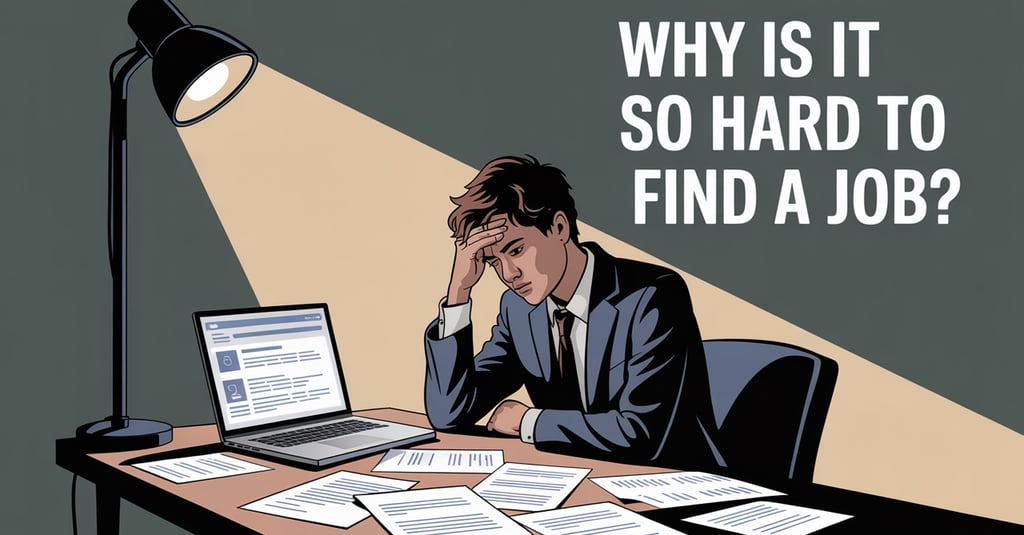Why is it So Hard to Find a Job?
If you’ve been sending out hundreds of resumes and hearing nothing back, you’re not alone—and you’re not the problem. From AI automation and economic shifts to delayed retirements and undervalued labor, the job market in Canada and beyond is undergoing a painful transformation. This article explores why even talented, educated, and motivated people are struggling to find work, and why the system—not the individual—is failing. Whether you're a recent grad, mid-career pivoter, or just feeling stuck, this is the perspective you've been searching for.
HRJOB SEARCH
Jeremy Golan
7/31/20254 min read


Why Is It So Hard to Find a Job?
The Job Market Feels Broken—And You're Not Imagining It
A few months ago, I sat across from a recent grad at a coffee shop in downtown Toronto. She clutched her resume like it was a lifeline. "I’ve sent out over 200 applications," she said, her voice cracking. "And all I’ve gotten are automated rejection emails. What am I doing wrong?"
I've had this conversation more times than I can count—with humanities graduates, international students, even professionals pivoting careers after years of experience. The frustration is raw, and the pain is real.
So let me say this clearly: if you're struggling to find work, you are not inadequate.
The economic system around us is shifting rapidly—some would argue it's breaking entirely. And while the U.S., the U.K., and other parts of the West are certainly feeling the pressure, Canada may be experiencing the sharpest edge of this instability.
Let’s unpack why.
What’s Changed? More Than You Think
1. Global Trade Wars and Decreased Demand for Domestic Labor
When trade tensions flared between the U.S. and China, the ripple effects touched everyone. Canada—deeply integrated into global supply chains—was no exception. Manufacturing slowed, export demand dropped, and companies became more cautious about hiring. Jobs that once absorbed new grads or career changers simply disappeared.
In 2023, Canada’s exports to China dropped by over 12%, according to Statistics Canada. This kind of shift contracts job opportunities at every level.
2. Automation and AI Are Shifting the Landscape
The rise of AI and machine learning is not just a tech story—it’s a labor story. Tasks once done by people are now managed by algorithms. From customer service to copywriting, even HR roles are being streamlined. And this isn’t just happening at the margins.
According to the World Economic Forum, by 2025, 85 million jobs may be displaced by machines, while 97 million new roles could emerge. The problem? Those new roles often require skills many people haven’t had the chance to acquire.
And while we may imagine some jobs as “safe,” even creative industries are feeling the pinch. Consumers are subscribing to AI-powered design tools or budgeting apps instead of hiring humans. The human premium is shrinking.
A Deloitte report in 2024 found that over 60% of Canadian businesses adopted at least one AI-based automation tool in the last two years, significantly reducing entry-level hiring.
3. Boomers Aren’t Retiring—They’re Reinforcing
One surprising trend: the Baby Boomer generation is retiring later than expected. Rising living costs, stock market volatility, and even a sense of identity tied to work are keeping many in the workforce longer.
According to the OECD, Canada has seen one of the sharpest increases in workforce participation among people aged 65 and older. This affects everyone down the ladder.
That might not sound like a big deal until you realize that it’s blocking the natural upward flow. Managers can’t move into senior roles because those above them aren’t leaving. Entry-level workers get stuck in internships or contracts because there’s no room above them. And when Boomers do retire, they often close or consolidate their businesses instead of passing the torch.
4. The Value of Human Labor Has Crashed
This is the part that hurts the most. In economic terms, the market has assigned less and less value to human labour over time. Whether it’s someone folding clothes in retail, managing a front desk, or doing social media part-time—the compensation often doesn’t match the energy or cost of living.
In Canada, real wages have stagnated or even declined for many sectors, even as housing, food, and transportation costs soar. If you feel like you're working harder and getting less in return—you’re not imagining it.
A 2024 RBC report showed that more than 40% of Canadian workers under 35 feel underemployed, despite having post-secondary education.
A Story That’s Becoming Too Common
Not long ago, I met a young man at a local employment center. He’d earned a degree in philosophy and had recently completed a tech bootcamp. He had the drive, the education, the soft skills—and yet, he was doing deliveries for a food app.
"I thought reskilling would be enough," he said. "But even entry-level tech jobs ask for 2–3 years’ experience. How do I get that when no one will take a chance on me?"
His story isn’t unique. And while some will argue that he should’ve gone into engineering or medicine, this kind of thinking only shifts the blame. The truth is, we need people across all disciplines—but our systems haven’t caught up.
What Do We Do Now?
I don’t have all the answers. Honestly, no one does. But I know we need to ask better questions:
How do we create pathways for people to contribute meaningfully?
How do we support those who want to work but are blocked at every turn?
What kind of social safety net do we need for a world where jobs are disappearing faster than they're created?
Because some people—despite their willingness, talent, and effort—may not find a place in the traditional workforce. And we have to find ways to value them anyway.
You Are Not Broken. The System Is.
Here’s what I want you to hear loud and clear: your worth is not measured by how hireable the economy thinks you are.
You are more than your job status. You have value. So do your neighbors. This world needs compassion, creativity, and care—things that rarely make it onto a resume but matter deeply in real life.
So help where you can. Be kind to strangers. Offer a hand to someone struggling. If you're in a stable role, consider mentoring someone who isn't. Even a conversation can be a lifeline.
We are heading into uncertain times, and we will all need each other more than ever.
Final Thoughts
We are in a moment of transition. The way we work, hire, live—it’s all being rewritten in real time. And yes, it’s frustrating. It's scary. And often unfair.
But don’t let the economy’s confusion convince you that you have no place in this world. You do.
And until we figure out how to build a system that sees everyone’s value, let’s start by reminding each other of it—out loud, and often.
If this resonated with you, share it with someone who’s struggling, or someone who’s hiring. Let’s keep the conversation going.
Your total HR Solution!
We take care of the "heavy lifting" so you can soar!
Support
Certified, experienced and insured.
924 N. Magnolia Ave, Suite 202-5448
Orlando, FL 32803
© 2025. All rights reserved.
